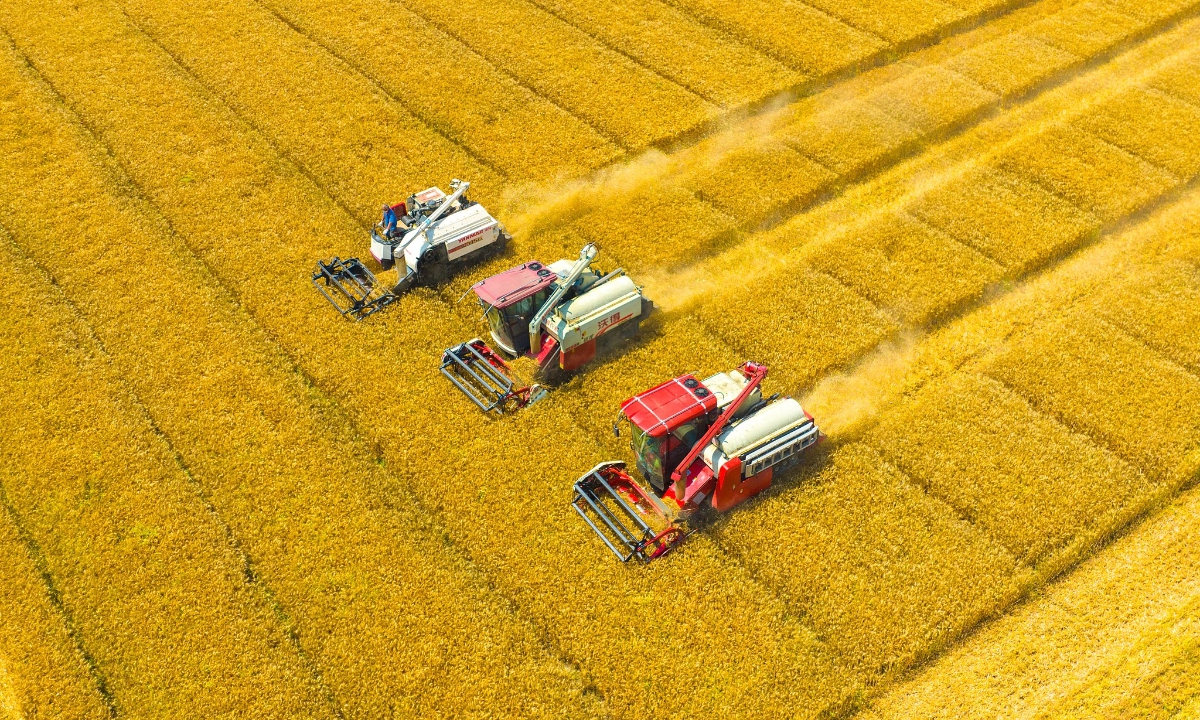
Grain harvest Photo: CFP
A Chinese expert called for the further promotion and implementation of the BRICS agricultural cooperation mechanism to better address current global food security issues at the ongoing 2023 China International Fair for Trade in Services (CIFTIS) in Beijing.
With the increasing impact of trade monopolies, protectionism disrupting global supply chains, and factors such as malicious speculation causing price fluctuations, food security is becoming a paramount issue for developing countries.
Experts suggest that, against this backdrop, strengthening cooperation among developing countries and improving their food supply security is urgently needed.
"BRICS countries should enhance cooperation in the industrial and supply chains for key agricultural products such as wheat, rice, corn and soybeans. If the BRICS agricultural cooperation mechanism can be implemented, it will make a significant contribution to global food security," said Cheng Guoqiang, a food expert from the School of Agricultural Economics and Rural Development at Renmin University of China, said during an industry forum at the services trade fair on Monday.
Cheng noted that in recent years, global production and consumption of wheat have been generally balanced, with a slight surplus, but distribution is notably uneven.
Data presented by Cheng showed that in 2021, the production of wheat in all developing countries was approximately 371 million tons, equivalent to 48.6 percent of the world's total.
However, the total demand of developing countries reached 504 million tons, equivalent to 65.9 percent of the world's total consumption, resulting in a supply-demand gap of 127 million tons.
Cheng said that developing countries must rely on imports to address food security issues. "But if imports encounter problems, even in a situation of ample global food supply, developing countries may face high prices they can't afford or disruptions in logistics that prevent them from obtaining food, leading to a so-called food crisis, he said.
Food safety issues are mainly concentrated in developing countries in Asia and Africa. Factors such as unequal distribution are the reasons for the food crisis.
The fundamental reason why 700 to 800 million people in developing countries face food security challenges is that food production and trade are highly concentrated in the hands of a few countries, while consumers are scattered across various developing countries, the expert said.
The next step in global food supply chain cooperation should find practical paths for cooperation and build mechanisms to promote practical cooperation, Chen said.
"This can be achieved by relying on global multilateral mechanisms, under the guidance of organizations like the UN or the WTO. Additionally, specific solutions can be tailored to initiatives like the Belt and Road or BRICS mechanisms," Chen said.
The total grain output of BRICS countries accounts for about 40 percent of the world, and the agricultural output value accounts for more than 50 percent of the world's total. The trade of agricultural products among the BRICS countries is highly complementary.
Cheng said that the role of BRICS in the global food security system will become increasingly prominent while calling for using the BRICS mechanism to consolidate global efforts to address food security challenges.
Global Times

